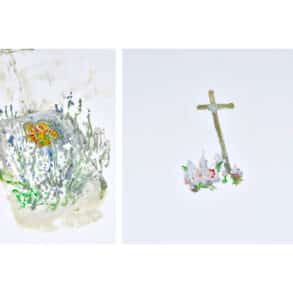On the path towards self-knowledge, the distinction between, and integration of, individuality and identity is essential to deepening engagement in the social currents of our time.
If we think of Anthroposophy as a path of inquiry into being in the world and being of service to the world, it matters that we form social foundations out of interest in both the circumstances of the material world and the beings of the spiritual world. One aspect of this anthroposophical inquiry is a living awareness of the lawfulness of the spiritual world, which differs from that of the material world. This difference is complicated, and I have found it essential to try to understand both, and their connection, as a way of discerning how to navigate some of the challenging social issues of our times.
I’ve approached this through a consideration of individuality as differentiated from identity. From an anthroposophical perspective, each human being is an embodiment of a unique individuality that is evolving over multiple incarnations. In this lifetime, through that embodiment, we form an identity which links pre-earthly intentions to the circumstances of a particular incarnation. The distinction between an anthroposophical understanding of individuality that includes reincarnation and karma, and how we understand identity in today’s terms, is a source of much confusion, conflict, and misunderstanding. Individuality and identity are connected, but they are not the same thing, and the tools for comprehending and working through them require different capacities.
Why is this difference so important to being present in the world? If someone tells me that they are suffering from or have felt offended by something I have said or written, I first want to take responsibility for the action. Have I caused this response? Have my words caused it? Or is it something in their experience or background that provoked it? Are there limits to my responsibility? How do we each grow from the interchange? How can we really see and hear each other?
Disavowing responsibility or simply assigning responsibility to the other person is generally counterproductive. I can take full responsibility for my own actions, but I cannot take responsibility for someone else’s reaction—I can only recognize and empathize with their response and learn from it. Each of us needs to meet and see the other, and out of the interaction, warmed by empathy, I can reflect for myself what is part of my path to self-knowledge, my short-comings or lack of awareness, and what remains in the invaluable domain of the other’s stories and paths.
I am the only one who can know the individuality that resides within myself—that which is my core-seed, so to speak. Identity, on the other hand, situated in a context of hereditary and chosen communities, is formed by external as well as internal influences. The capacity to understand identity formation arises from a deep interest in others and their stories and a real inquiry into one’s own biography. Moving toward spiritual freedom—if that is an intention—hinges on knowing one’s spirit self, one’s individuality, within the intrinsic and extrinsic formation of identity. And striving for spiritual freedom supported by a meditative capacity and discipline on that path is solely my responsibility. Part of the unfolding of an individual’s karma arises from navigating between individuality and identity and the ability to work through and integrate the two.

Reflective Discipline
We bring some “knowing” or traits with us from prior incarnations—things we recognize and, out of freedom, may decide to work through. At the same time, we are born in a particular time, place, and social circumstances. Our behaviors and character patterns emerge at the point of encounter between these inner impulses and external forces. In Chapter 4 of Knowledge of Higher Worlds, Rudolf Steiner coaches us on handling these given and emergent traits on our path of self-knowledge:
In addition to anger and irritation, we must also struggle against other traits, such as fearfulness, superstition, prejudice, vanity, ambition, curiosity, the urge to gossip, and the tendency to discriminate on the basis of such outer characteristics as social status, gender, race, and so on… Misunderstandings can easily arise if, for example, we believe that the injunction to overcome fear means becoming foolhardy; or to fight against discrimination based on social status and race means becoming blind to differences among people. The fact is that we learn to recognize these differences for what they are only when we are no longer caught up in prejudice. Even in ordinary life, fear of a thing prevents us from seeing it properly. In this sense, racial prejudice prevents us from seeing into a human soul. The esoteric student must take such ordinary common sense and perfect it inwardly with great sensitivity and precision.
The path of self-knowledge is, therefore, both a creator of inner freedom and a result of it. That is, the more we can truly observe ourselves with a will for truth and self-transformation, the more clearly we see our identity in relation to our sense of our individuality and its purpose in this particular incarnation.
An inquiry into our identity can make visible what we have inherited from our cultural milieu in our early development, from our families across generations, from our education and peers, and from our natural and sub-natural environment. In the process of excavating the layers of our conditioning, a new consciousness emerges. It becomes possible to say yes or no to carrying forward aspects of that conditioning. And significantly, along the way, we might start to have glimmers of our individuality. We get glimpses of what is there when everything that shaped our identity is peeled away.
Such profound discipline for self-reflection will take us into the complexity of our assumptions about the world, so that we can recognize, take responsibility for, and manage them in such a way that they do not cloud our view into individuality or create barriers to relationships. Make no mistake, this is an arduous discipline that takes time to unfold. It abides no sentimentality, no entitlement, and no lack of will.

Freedom and Agreements
Western dominant culture has celebrated the notions of ego, self, and identity. That one can claim to be a self-made person is an emblematic example of this. We can trace the origin of the “me generation” to the mid-fifteenth century, the Renaissance, and the advent of an anthropocentric worldview. At that formative time, individual initiates brought powerful insights from the spiritual world to culture. But the existing power structures—religious and economic—were inherently antipathetic to change. They chose instead the path of self-interest in order to maintain control over rights and economic life.
The loss of the more esoteric aspects and deep service to humanity of these initiates, the conflation of religion and political power, and the control of natural resources marked an attachment to and ascent of materialism accompanied by the dominance of capital. In the battle of the marketplace, identity became a commodity.
Such materialism devalued human experience because it focused on the tangible and measurable. Increasingly refined representations of appearances and renderings of what things look like on the surface led to imagining that the representation was the reality, which in turn led to imagining that one could replicate the human being (the automaton) or even improve on it (the transhuman). Out of this thread of arrogant self-interest, spurred on by commerce and the capital driving it, capacities to truly meet and see each other have suffered. Relationships thrive on empathy, compassion, and ethical practices to guide connection in the spaces between us. They are our social warmth body, a body not particularly in the calculus of self-interest. The “social distancing” of the last few years began well before it was named and measured as such. What was arising out of devaluing relationship and substituting social media for it was a kind of malaise, or social dis-ease.
The path toward knowing our individuality in light of the commodification of identity presents us with one of the greatest challenges of our time: the exercise of inner freedom brought into the field of social life. We, as individuals, need to get along, create and abide by agreements, and find the value of community—as antidotes to the current social dis-ease.
What, then, are the agreements that we create and live by now, today, that make it possible for us to come together collaboratively out of respect for each other’s freedom and that help us to form and hold community and govern organizations? To address this, the distinction between inner, cultural freedom and outer, political, or legislated freedom is paramount. Inner freedom attends the path of self-knowledge and arises from self-responsibility. Outer freedom, associated with law, arises from and is bounded by the agreements we create together. This quality of freedom, for example, freedom of speech, is founded on a principle of equality and is changeable by social policy processes over time. For example, I am free to say yes or no to an agreement, and I am free to renegotiate that agreement, but once I have said yes, I am no longer free of the agreement or the social responsibility for it.

Navigating between the two kinds of freedom is fraught with misunderstanding and the potential for polarization. Such a process requires a deep step into an ethic of responsibility not only for the exercise of free self but also for that of each other. No one is exempt from that responsibility. This speaks to a level of agreement that is based in love and trust—quite the opposite of our current jurisprudence, which arises from distrust—and stepping into a newly shaped social ethic which respects the humanity and dignity of each individual. This is an ideal, and, as with any ideal, maybe it can be a north star that shapes our relationships and how we govern and manage ourselves as we step toward a more human and peaceful future.
Here is an example of how far we are from the ideal. I work frequently with organizations and finance. One glaring counter to this ideal I often see resides in the conventions around compensation for work. Instead of paying people in advance, out of trust, freeing them to work out of their destiny capacities rather than for the money, we commoditize the labor, give it a price, and only pay when the work is complete. While we may want people to work out of freed will, a labor-purchase pay structure countermands that hope. So, there is much work ahead in the economic sphere to transform and humanize practices.
Each person is incarnating spirit in physical matter and is carrying knowledge of the spiritual world and its lawfulness in the world of material lawfulness. Understanding and acting out of a “both/and” consciousness is anthroposophical discipline. Yet, the exercise of such a discipline can never separate us from the currents of the world or from coming to know each other soul to soul. For individuality to shine forth in freedom requires that we find healing and health in the embattled field of identity, where economics, commerce, politics, and power can overshadow the beauty of relationship and culture. Taking this on is an individual responsibility as we each navigate the inner space of knowing individuality and identity, individually and in community.
There is so much to learn and unlearn in this process. Practicing forgiveness and love, with others and ourselves and in an honest relationship with truth, is a necessary condition. It is hard to find any certainty and any comfort. However, it is not a time for comfort; comfort sits at the edge of sleep. Knowing one’s individuality and identity, seeing them as parts of one reality, is a way toward peace with one’s self and in the world. An ever more human future depends on it.
Title image Nicolas Gras Hs; Source of all images unsplash









